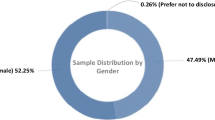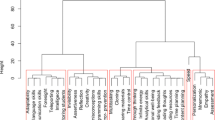Abstract
This study is devoted to the study of the digital divide between the developed and frontier regions of China, as a model for solving the problems of the global digital divide. The research is based on a representative sample of 1,520 high school students and 220 teachers. The study included several successive stages; each of them was devoted to finding an answer to one of the formulated research questions or confirming/rejecting the corresponding hypotheses. The first stage was a survey. The researchers then tested for correlations between scores within the same geographic region. The study revealed statistically significant differences in the assessments and the level of proficiency in digital education tools in groups from developed and frontier regions, and using correlation analysis revealed the absence of significant differences in the assessments between genders in all regions and groups and established a strong correlation between the assessment of methods for e-education and the degree of proficiency and familiarity with this tool. The key reason for the digital divide was found to be insufficient access to technology rather than psychological opposition, unpreparedness for e-education, or other reasons.


Similar content being viewed by others
Data availability
Data will be available on request.
References
Abad-Segura, E., González-Zamar, M. D., Infante-Moro, J. C., & Ruipérez García, G. (2020). Sustainable management of digital transformation in higher education: Global research trends. Sustainability, 12(5), 2107. https://doi.org/10.3390/su12052107.
Almeida Filho, N., & Coutinho, D. (2019). Counter-hegemonic higher education in a remote coastal region of Brazil: The Federal University of Southern Bahia as a case study. In R. Aman, & T. Ireland (Eds.), Educational Alternatives in Latin America (pp. 143–174). Palgrave Macmillan. https://doi.org/10.1007/978-3-319-53450-3_7.
Blažič, B. J., & Blažič, A. J. (2020). Overcoming the digital divide with a modern approach to learning digital skills for the elderly adults. Education and Information Technologies, 25(1), 259–279. https://doi.org/10.1007/s10639-019-09961-9.
Calderon Gomez, D. (2021). The third digital divide and Bourdieu: Bidirectional conversion of economic, cultural, and social capital to (and from) digital capital among young people in Madrid. New Media & Society, 23(9), 2534–2553. https://doi.org/10.1177%2F1461444820933252.
Cen, X., Sun, D., Rong, M., Fekete, G., Baker, J. S., Song, Y., & Gu, Y. (2020). The online education mode and reopening plans for chinese schools during the COVID-19 pandemic: A mini review. Frontiers in Public Health, 8, 566316. https://doi.org/10.3389/fpubh.2020.566316.
Chen, T., Peng, L., Yin, X., Rong, J., Yang, J., & Cong, G. (2020). Analysis of user satisfaction with online education platforms in China during the COVID-19 pandemic. Healthcare, 8(3), 200. https://doi.org/10.3390/healthcare8030200.
Chiodo, S., & Schiaffonati, V. (2021). The italian philosophy of Technology. Springer International Publishing.
Darcy, S., Yerbury, H., & Maxwell, H. (2019). Disability citizenship and digital capital: The case of engagement with a social enterprise telco. Information Communication & Society, 22(4), 538–553. https://doi.org/10.1080/1369118X.2018.1548632.
Dezhong, W. (2022). E-education in frontier area in China under the perspective of philosophy of technology. In N. S. Krasnokutska (Ed.), Slobozhan scientific readings: socio-economic and humanitarian-legal dimensions [Electronic resource]: materials All-Ukrainian. science and practice conference, November 15–16, 2022 (pp. 127–129). Kharkiv: National Technical University “Kharkiv Polytechnic Institute”. Retrieeved 15 June 2023 from http://repository.kpi.kharkov.ua/handle/KhPI-Press/61305.
Dutta, D., & Dutta, D. (2018). Development under Dualism and Digital divide in Twenty-First Century India. Springer.
Eglash, R., Bennett, A., Cooke, L., Babbitt, W., & Lachney, M. (2021). Counter-hegemonic computing: Toward computer science education for value generation and emancipation. ACM Transactions on Computing Education (TOCE), 21(4), 1–30. https://doi.org/10.1145/3449024.
Emejulu, A., & McGregor, C. (2019). Towards a radical digital citizenship in digital education. Critical Studies in Education, 60(1), 131–147. https://doi.org/10.1080/17508487.2016.1234494.
Field, A. (2022). Mining the ambient commons: Building interdisciplinary connections between environmental knowledge, AI and creative practice research. Interdisciplinary Science Reviews, 47(2), 185–198. https://doi.org/10.1080/03080188.2022.2036408.
Flavin, M. (2017). Disruptive technology enhanced learning: The use and misuse of digital technologies in higher education. Springer.
Gladkova, A., & Ragnedda, M. (2020). Exploring digital inequalities in Russia: An interregional comparative analysis. Online Information Review, 44(4), 767–786. https://doi.org/10.1108/OIR-04-2019-0121.
Hill, C., & Lawton, W. (2018). Universities, the digital divide and global inequality. Journal of Higher Education Policy and Management, 40(6), 598–610. https://doi.org/10.1080/1360080X.2018.1531211.
Hu, Y., & Zhang, H. (2020). ICT in education in China. In C. K. Looi, H. Zhang, Y. Gao, & L. Wu (Eds.), ICT in Education and Implications for the Belt and Road Initiative (pp. 15–35). Springer. https://doi.org/10.1007/978-981-15-6157-3_2.
Jiang, H., Islam, A. Y. M., Gu, X., & Spector, J. M. (2021). Online learning satisfaction in higher education during the COVID-19 pandemic: A regional comparison between Eastern and Western Chinese universities. Education and Information Technologies, 26(6), 6747–6769. https://doi.org/10.1007/s10639-021-10519-x.
Keyser, D. (2020). Assessing the Digital Hegemony August 2020. IMSISS. https://www.researchgate.net/profile/Daniel-Keyser/publication/349412880_Assessing_the_Digital_Hegemony/links/602ecd4192851c4ed5804363/Assessing-the-Digital-Hegemony.pdf.
Kintonova, A., Povkhan, I. F., Sabitov, A., Tokkuliyeva, A., & Demidchik, N. (2022). Online learning technologies. In 2022 IEEE 7th International Energy Conference (ENERGYCON) (pp. 1–8). Riga, Latvia: IEEE. https://doi.org/10.1109/ENERGYCON53164.2022.9830387.
Knox, J. (2019). What does the ‘postdigital’ mean for education? Three critical perspectives on the digital, with implications for educational research and practice. Postdigital Science and Education, 1(2), 357–370. https://doi.org/10.1007/s42438-019-00045-y.
Leontiev, A. (1978). The development of the psyche. Horizonte University.
Leontiev, A. (1999). The development of voluntary attention in the child. In P. Lloyd, & C. Fernyhough (Eds.), Lev Vygotsky: Critical assessments (pp. 89–113). Routledge. https://searchworks.stanford.edu/view/4016244.
Lin, H. (2021). Present situation and optimization strategy of digital education resources supply in China. International Journal of Social Sciences in Universities, 4(2), 258–259.
Lissitsa, S., & Chachashvili-Bolotin, S. (2019). The effect of digital variables on perceived employability in an ethnic minority and the hegemonic group. Israel Affairs, 25(6), 1082–1104. https://doi.org/10.1080/13537121.2019.1670471.
Liu, M., Zha, S., & He, W. (2019). Digital transformation challenges: A case study regarding the MOOC development and operations at higher education institutions in China. TechTrends, 63(5), 621–630. https://doi.org/10.1007/s11528-019-00409-y.
Luo, W., Berson, I. R., Berson, M. J., & Han, S. (2022). Between the folds: Reconceptualizing the current state of early childhood technology development in China. Educational Philosophy and Theory, 54(10), 1655–1669. https://doi.org/10.1080/00131857.2021.1933945.
Luria, A. R. (1965). L. S. Vygotsky and the problem of localization of functions. Neuropsychologia, 3, 387–392. https://doi.org/10.1016/0028-3932(65)90012-6.
Luria, A. R. (1966). Human brain and psychological processes. Harper & Row.
Ma, G. (2020). Sparking interdisciplinarity: Let’s take framing students as customers in higher education seriously. Interdisciplinary Science Reviews, 45(4), 461–476. https://doi.org/10.1080/03080188.2019.1695171.
Okanda, P., & Zeleza, P. T. (2019). Enhancing demand driven digital and technological skills development. In African Economic Conference (pp. 1–11). African Development Bank, United Nations Development Program, and the United Nations Economic Commission for Africa.
Quaicoe, J. S., & Pata, K. (2020). Teachers’ digital literacy and digital activity as digital divide components among basic schools in Ghana. Education and Information Technologies, 25(5), 4077–4095. https://doi.org/10.1007/s10639-020-10158-8.
Ragnedda, M. (2017). The third digital divide: A weberian approach to digital inequalities. Routledge.
Ragnedda, M. (2018). Conceptualizing digital capital. Telematics and Informatics, 35(8), 2366–2375.
Ragnedda, M., & Ruiu, M. L. (2017). Social capital and the three levels of digital divide. In M. Ragnedda, & G. W. Muschert (Eds.), Theorizing Digital divides (pp. 21–34). Routledge. https://doi.org/10.4324/9781315455334.
Ragnedda, M., & Ruiu, M. L. (2020). Digital capital: A bourdieusian perspective on the digital divide. Emerald Group Publishing.
Schulte, B. (2018). Digital technologies for education in China: National ambitions meet local realities. In M. Stepan (Ed.), Serve the people. Innovation and IT in China’s development agenda (pp. 31–38). Mercator Institute for China Studies. https://doi.org/10.1007/s11528-019-00409-y.
Shestak, V., Gura, D., Khudyakova, N., Shaikh, Z. A., & Bokov, Y. (2022). Chatbot design issues: Building intelligence with the cartesian paradigm. Evolutionary Intelligence, 15(4), 2351–2359. https://doi.org/10.1007/s12065-020-00358-z.
Song, Z., Song, T., Yang, Y., & Wang, Z. (2019). Spatial–temporal characteristics and determinants of digital divide in China: A multivariate spatial analysis. Sustainability, 11(17), 4529. https://doi.org/10.3390/su11174529.
Song, Z., Wang, C., & Bergmann, L. (2020). China’s prefectural digital divide: Spatial analysis and multivariate determinants of ICT diffusion. International Journal of Information Management, 52, 102072. https://doi.org/10.1016/j.ijinfomgt.2020.102072.
Tang, Q., Laitochová, J., Lei, Y., & Nocar, D. (2018). Digital resource trends in education in ethnic areas of China. In L. Gómez Chova, A. López Martínez, I. Candel Torres (Eds.), ICERI2018 Proceedings (pp. 2497–2502). Seville, Spain: IATED. https://doi.org/10.21125/iceri.2018.1548.
Tesar, M., Hytten, K., Hoskins, T. K., Rosiek, J., Jackson, A. Y., Hand, M., Roberts, P., Opiniano, G. A., Matapo, J., Pierre, S., Azada-Palacios, E. A., Kuby, R., Jones, C. R., Mazzei, A., Maruyama, L. A., O’Donnell, Y., Dixon-Román, A., Chengbing, E., Huang, W., Chen, Z., Peters, L., M. A., & Jackson, L. (2022). Philosophy of education in a new key: Future of philosophy of education. Educational Philosophy and Theory, 54(8), 1234–1255. https://doi.org/10.1080/00131857.2021.1946792.
Van Dijk, J. (2017). Afterword: The state of digital divide theory. In M. Ragnedda, & G. W. Muschert (Eds.), Theorizing Digital divides (pp. 199–206). Routledge. https://doi.org/10.4324/9781315455334.
Van Dijk, J. (2020). The digital divide. John Wiley & Sons.
Vishkaie, R. (2020). The pandemic, war, and sanctions: Building resilience for the digital divide in education. Interactions, 27(4), 36–37.
Vygotsky, L. S. (1987). The collected works of LS Vygotsky: The fundamentals of defectology (Vol. 2). Springer Science & Business Media.
Vygotsky, L. S. (1997). The collected works of LS Vygotsky: Problems of the theory and history of psychology (Vol. 3). Springer Science & Business Media.
Wang, J. (2021). A review of the development of the integration strategy of information technology and education in the four countries of the United States, Britain, China, and Singapore. Science Insights Education Frontiers, 9(2), 1283–1303. https://doi.org/10.15354/sief.21.re042.
Wang, L., & Liu, C. (2022). The role of motivation in the digital divide: The moderating effect of device access. Mobile Media & Communication, 10(3), 406–420. https://doi.org/10.1177%2F20501579211060621.
Wang, Y., Wang, Y., Stein, D., Liu, Q., & Chen, W. (2021). The structure of chinese beginning online instructors’ competencies: Evidence from bayesian factor analysis. Journal of Computers in Education, 8(3), 411–440. https://doi.org/10.1007/s40692-021-00186-9.
Xue, E., Li, J., & Xu, L. (2022). Online education action for defeating COVID-19 in China: An analysis of the system, mechanism and mode. Educational Philosophy and Theory, 54(6), 799–811. https://doi.org/10.1080/00131857.2020.1821188.
Yan, P., & Schroeder, R. (2020). Variations in the adoption and use of mobile social apps in everyday lives in urban and rural China. Mobile Media & Communication, 8(3), 318–341. https://doi.org/10.1177%2F2050157919884718.
Yang, W., & Fan, G. (2019). Post-PISA education reforms in China: Policy response beyond the digital governance of PISA. ECNU Review of Education, 2(3), 297–310. https://doi.org/10.1177%2F2096531119878557.
Yang, Q., & Lee, Y. C. (2021). The critical factors of student performance in MOOCs for sustainable education: A case of chinese universities. Sustainability, 13(14), 8089. https://doi.org/10.3390/su13148089.
Zhang, L. (2020). Overview of the poverty-alleviation by supporting education in China. Science Insights Education Frontiers, 6(2), 631–651. https://doi.org/10.15354/sief.20.re010.
Zhang, J., & Yu, S. (2023). Reconceptualising digital pedagogy during the COVID-19 pandemic: A qualitative inquiry into distance teaching in China. Innovations in Education and Teaching International, 60(2), 174–184. https://doi.org/10.1080/14703297.2021.2000473.
Zhong, B., Zhu, F., & Xia, L. (2021). Is there a digital divide between urban students and migrant students in China? SAGE Open, 11(2), 1–10. https://doi.org/10.1177%2F21582440211016387.
Funding
Heilongjiang Province Philosophy and Social Science Research Planning Annual Project (Approval No. 21KSB096).
Author information
Authors and Affiliations
Corresponding author
Ethics declarations
Competing interests
This research has no conflict of interests.
Additional information
Publisher’s Note
Springer Nature remains neutral with regard to jurisdictional claims in published maps and institutional affiliations.
Rights and permissions
Springer Nature or its licensor (e.g. a society or other partner) holds exclusive rights to this article under a publishing agreement with the author(s) or other rightsholder(s); author self-archiving of the accepted manuscript version of this article is solely governed by the terms of such publishing agreement and applicable law.
About this article
Cite this article
Wang, D. A “live” and E-education in a frontier area in China under the perspective of the philosophy of technology. Educ Inf Technol 29, 6611–6630 (2024). https://doi.org/10.1007/s10639-023-12118-4
Received:
Accepted:
Published:
Issue Date:
DOI: https://doi.org/10.1007/s10639-023-12118-4




